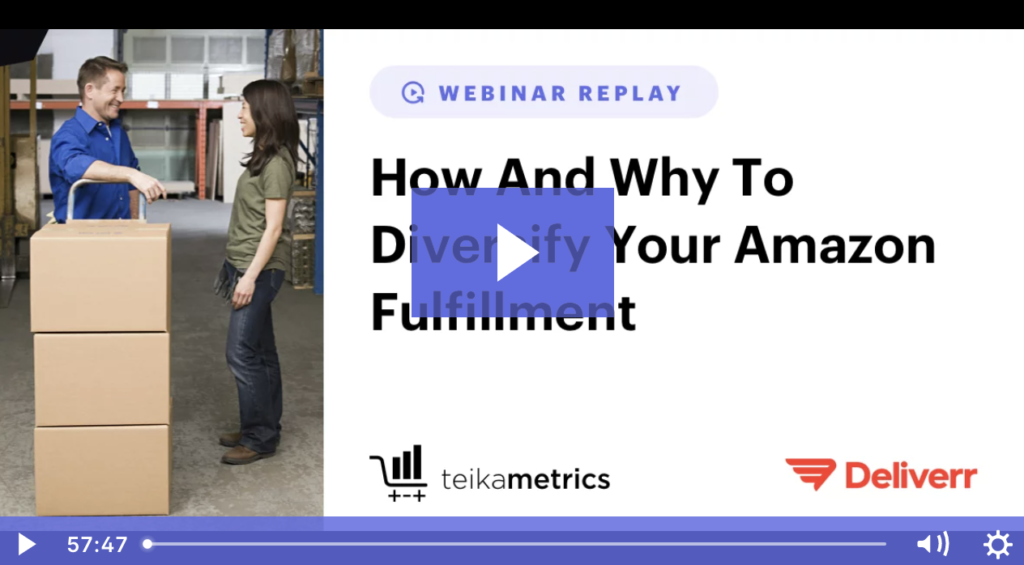You may remember earlier this year when Amazon FBA halted inbound shipments and delayed Prime deliveries of non-essential items. During this time, Fulfillment By Merchant became a topic of interest for many third-party Amazon sellers. In order to foolproof their holiday fulfillment, many merchants now have FBM listing backups.
If you’re considering FBM as an alternative, here’s everything you need to know, including what’s involved and whether it’s the right option for your business right now.
What is FBM?
Amazon Fulfillment By Merchant (FBM) is when you’re responsible for the storage, picking, packing, and shipping of products to customers – either yourself or via a third-party. This is instead of using Amazon FBA to fulfill orders for you.
How much does FBM cost?
You don’t pay Amazon anything for fulfilling orders under FBM, other than your usual seller fees. However, it would be wrong to say that FBM is free, because there are costs involved in managing your own fulfillment.
- Warehouse space
- Staffing
- Insurance
- Packaging
- Shipping
What’s involved in FBM?
There are two ways to run FBM: In-house and outsourced to another provider.
In-house fulfillment
In-house fulfillment involves completing the entire fulfillment process yourself, including:
- Receiving and storing items
- Picking and packaging orders received
- Shipping orders to customers
For small and low-volume stores, this might be a fairly easy set of tasks to assume during the current environment, either at home or in an existing office or warehouse space.
However, if you’re a larger seller or it’s not possible for you to build an in-house fulfillment operation in the current crisis, you can still sell via FBM using a third-party fulfillment provider.
FBM fulfillment provider
An FBM fulfillment provider is a third-party fulfillment partner who operates similarly to Amazon Prime, by:
- Receiving and storing items for you
- Picking and packaging shipments
- Shipping orders
However, they don’t rely on Amazon’s fulfillment network. Instead, FBM fulfillment providers use their own fulfillment networks. Deliverr, for example, has a fulfillment network that remains fully operational for nationwide 2-day delivery and is open to all merchants.
If you’re approved for Seller Fulfilled Prime, you can even maintain your Prime badge while self-fulfilling or using a fulfillment provider.
How to decide if FBM is right for my business
To determine whether FBM is right for your business, ask yourself the following questions:
- Are you still operational?
Just because eCommerce is booming during the COVID-19 outbreak, doesn’t mean that your business is. If your staffing levels and productivity are hampered by illness, childcare issues, or lockdown, then you might be unable to operate in-house FBM right now. If this is the case, look into an FBM fulfillment partner.
- Are you selling non-essential items?
If you’re selling essential items, like groceries, healthcare items, or baby products, FBA may still accommodate you.
If you’re selling non-essential items on Amazon using FBA, then your sales will be affected by the Amazon FBA restrictions. You could sell out and have no way to replenish, or buyers could go elsewhere after seeing long delivery times.
FBM overcomes this problem by keeping stock levels healthy and maintaining fast deliveries for your customers. This ensures that your items are available, especially when buyers need you most, and at a time your competitors might not be there.
- Are you using multi-channel FBA?
With Amazon no longer being the fastest shipper around, online shoppers may shop via other fast shipping programs such as Walmart 2-day delivery, Wish Express, or eBay Fast ‘N Free.
If you’re using multi-channel FBA, fulfillment of orders via these sales channels will be hampered, which could damage your fast shipping program eligibility.
FBM ensures that you can maintain shipping speeds and standards across your sales channels, keeping you eligible for other fast shipping programs.
Tip: Aim for inventory efficiency by using a fulfillment provider that can support multiple fast shipping programs.
- Can you maintain fast shipping speeds in house?
If you’re able to deliver items to customers reliably, you’ve taken the first step towards self-fulfilled FBM. But you still need to deliver them quickly. If you can’t get items to customers in less than a week, you’ll want to find someone who can.
- How are your products performing?
If you sell non-essential items that aren’t performing well in the current climate (for a reason other than shipping speeds), then it doesn’t make commercial sense to change your fulfillment method.
However, if your products are performing well, or you’re expanding your product lines to introduce items that will sell well, then fulfilling these items in-house or via a third-party fulfillment provider makes commercial sense – allowing you to benefit while you can.
- Do you sell seasonal or expiration-dated products?
If you’ve got a limited window of opportunity to sell your stock, because of seasonal trends or expiration dates, then FBA’s current restrictions could significantly damage your annual profits.
Switching to FBM allows you to continue to benefit from seasonal sales or to sell stock that may expire before Amazon relaxes its restrictions.
- What is your competition doing?
While you might be willing to outride the storm of limited FBA, your competitors might not be. If online shoppers can find your items with quicker shipping times from someone else, then there’s little reason for them to remain loyal to your brand – especially if it’s something they need urgently.
- How much are you paying for Amazon FBA?
Amazon FBA isn’t always the cheapest fulfillment option, especially if you sell slow-moving, heavy, or bulky items, or if you use multi-channel FBA. Use a fulfillment cost calculator to see whether you can use this as an opportunity to decrease your fulfillment costs at a time you need a little extra cash.
- Are you still advertising?
Finally, if you’re investing in Amazon advertising to put your brand at the forefront of the eCommerce boom, you need to do everything you can to ensure clicks result in sales. This includes having a well-optimized listing, high-quality product images, in-stock products, fast shipping speeds, and an ad strategy to match your fulfillment strategy.
If FBA is preventing this, then it’s time to consider your alternative option.
FBM – Final Thoughts
Fulfillment By Merchant is used by many successful Amazon sellers across the globe. While you may not have anticipated being forced to change your fulfillment methods so soon, this could be the lucky break you were waiting for.
Learn more about FBM in this Webinar Replay:

About the Author

Deliverr’s FBA-like multi-channel fulfillment comes with clear pricing, easy onboarding and a hassle free experience so you can focus on growing your eCommerce business.

